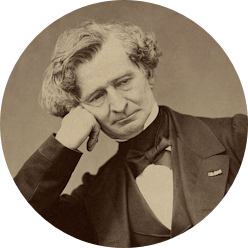
Hector Berlioz
December 11, 1803 - La Côte Saint-André (France) — March 8, 1869 - Paris (France)
© Pierre Petit
About
Hector Berlioz, the great representative of French Romanticism
Hector Berlioz was a composer, conductor, man of letters, passionate artist, bold and committed. He undertook his musical education very freely at the risk of exclusion from the traditional channels. He was a pupil of Lesueur at the Paris Conservatoire where he preferred creating havoc rather than study. He resisted his parents’ ambition for him to be a doctor and although he failed to win the Prix de Rome four times, his passion for Ludwig von Beethoven, Christoph Willibald Gluck and William Shakespeare was to be of a greater asset to his composer’s imagination.
Hector Berlioz's orchestral modernity
He acquired a reputation as literary critic through his talented writing, independent and fighting spirit; it took some time, however, before Hector Berlioz the was to gain recognition as a composer. His operas were failures and the public remained perplexed when faced with the novelty of his works. As early as 1830, the unfailing success of his eternal Symphonie Fantastique announced a new approach to orchestration. His music is structured like his autobiography and reflects his stormy love affairs, devouring passions and immense despair.
Berlioz's legacy
A truly modern composer, Hector Berlioz wrote essays to establish his orchestral discoveries. For him, instruments became individuals. He meticulously analysed and detailed the tones and possibilities of an orchestra. The Damnation of Faust (1846), The Childhood of Christ (1854) and Romeo and Juliette (1839) bear witness to this extraordinary temperament admired by Franz Liszt who never ceased to play his works at Weimar. The emblematic Romantic figure of Berlioz, exhausted, worn down by sorrow, bitterness and illness, died in 1868 aged sixty-six.

